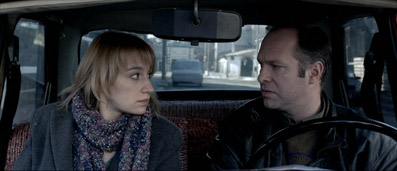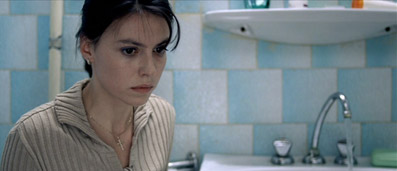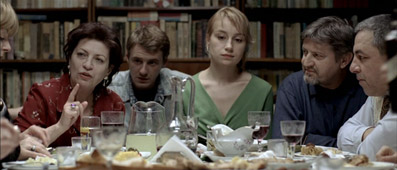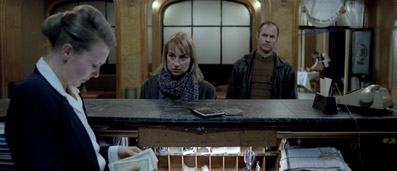|
Abortion, claimed Johnny Rotten in a glib defence of the Sex Pistols song Bodies, is a messy business. It's a subject that still violently divides opinion and I use the word violently with good reason. After all, how many of us run the risk of being harmed or even killed by our fellow citizens because of what we do for a living? I'm not going to get into a discussion of the ethics or otherwise of abortion and the right to choose here. As a man, and thus someone who will never have to contemplate going through the process, I'm not convinced I have the right to express an opinion anyway.
There are some people who will tell you that Cristian Mungiu's 4 Months, 3 Weeks & 2 Days is not about abortion. They're not trying to be deliberately deceptive, they just want you to see this film and are concerned that if you even catch a whiff of its subject matter then you'll give it the widest of berths. Let's get one thing straight, it is about abortion, but it's also about a whole lot more. And yes, you should see it. That doesn't mean adding it to a list for later attention – make it a priority.

Set in 1987 Bucharest during the last years of Romanian communism, the film opens in a student dorm as two friends, Otilia (Anamaria Marinca) and Gabita (Laura Vasiliu), make preparations for an unspecified trip that both appear to be a litle apprehensive about taking. Of course, if you know anything at all about the film before you sit down to watch it, or have even read the first paragraph of this review, then you'll have a pretty good idea of where they're going, or at least what's expected to happen when they get there. Nevertheless, the film does appear to go out of its way to avoid revealing this until the pair reach their destination – the phone calls and hotel frustrations are kept deliberately non-specific, building a sense of mystery that is dispelled with the almost offhand revelation that the hotel room they've gone to such pains to secure is where Gabita will have an illegal abortion.
Knowing this in advance – and it would take some serious information avoidance not to – surprisingly does the first act no harm at all, with the obstacles that Otilia encounters in her efforts to secure the hotel room proving all the more frustrating when you appreciate its importance to her and the reasons for her secrecy. The build-up also provides a window into life in late 1980s Romania: the dorm dealer who bypasses goods shortages to supply anything from cigarettes to Tic-Tacs; the parade of hotel reception staff on nominal power kicks; the ID cards whose ownership and presentation is required for even straightforward transactions. But it's the girls' encounter with abortionist Bebe (Vlad Ivanov) that is the film's dramatic centrepiece, and the point at which it really does part company with just about every previous film even touching on this still emotive issue. Bebe may enter and depart from the story in traditional manner, but unlike the fleeting appearances or invisible presence we are used to with such figures, he is, from the moment we meet him, given equal character footing with the two girls and his presence dominates the film's midsection.

Bebe is the dark underside of covert free enterprise – while others deal in cigarettes and milk powder, he provides a service that could have serious consequences for all involved should his actions come to light. A ruthless, amoral and self-protective businessman with a strict routine for every aspect of his work, the girls' circumstance-forced deviation from his instructions brings the three into immediate conflict, while Gabita's dishonesty about the length of her pregnancy almost cancels the deal on the spot. Bebe holds the power cards here and he knows it, and like the obstructive hotel receptionists who frustrate every enquiry Otilia makes, he has no qualms at all about abusing it.
What follows should not be revealed in advance; all you need to know is that this is no easy ride either for the girls or the audience. The abortion itself presented with the sort of frankness (I hesitate to call it explicit, but it's only a few notches short) that is likely to have all but the most thick-skinned viewer shifting in their seat and tipping their hat to the bravery of actress Laura Vasiliu, though it can't have been an easy time for Vlad Ivanov either. It's in this extended real-time hotel room sequence that the film's central concerns becomes clear, those of the loyalties of friendship, how far they can be pushed and how damaging the decisions made in its name can prove both to the individuals in question and the bond that binds them.
The focus of its effects is Otilia, whose frustrations and torments are brilliantly captured by rising star Anamaria Marinca, nowhere more vividly than at the family dinner party she is pressured to attend by her boyfriend Adi. Unable to reveal to him her initial reason for declining, she agrees to make a brief appearance (it's his mother's birthday and the opportunity to introduce Otilia to the family), leaving Gabita in the hotel room to cope with the second stage of the procedure alone. It's here that director Cristian Mingiu's technique of covering each sequence in a single, non-angular master shot is at its most effective, as Otilia is claustrophobically trapped by the the scope frame and the family's exuberant chatter for an unbroken 8-minute shot, one that vividly communicates Otilia's suppressed but inwardly screaming desire to be elsewhere. Marinca's performance is crucial to why this scene works so well, painting an astonishingly honest picture – that is never for a second overplayed – of Otilia's mounting agitation and alienation from the assembled group. If you've ever been in such a situation yourself – and there's barely a social function I attend where I don't to some degree – then this will strike a particularly empathic chord.

It's this combination of performance, observational direction and a refusal to shy away from the specifics of what the girls have to go through (with two notable and well-judged exceptions) that bind us so tightly to Otilia's view of events and make 4 Months, 3 Weeks & 2 Days such an unwaveringly compelling and dramatically intense experience. It's not easy viewing and nor should it be, but it is bold, intelligent and involving filmmaking at a time when the badge of bravery is too often awarded for little more than small deviations from established formula. One of the crucial films of 2008, 4 Months, 3 Weeks & 2 Days was a most worthy Palme D'Or winner, and provides further evidence of the sheer quality and importance of new Romanian cinema. If funding is not immediately forthcoming for Mungiu's next feature and if Anamaria Marinca doesn't become one of the most sought-after actors in international cinema then there really is no justice, or common sense, at work in the film world.
A first class 2.35:1 anamorphic transfer with excellent contrast and detail, the colour deliberately drained to drab blues, greys and browns for period effect through a combination of bleach bypass processing and digital colour timing,
Two soundtracks are included, Dolby stereo 2.0 and a surround track with the unusual stamp of Dolby 3.1. Whatever the coding decision, the 3.1 track is a winner, having the crystal clarity of the 2.0 track but with some very distinct separation work and effective use of the surrounds, particularly for location atmospherics.
The optional English subtitles sit in the black border area for single line text and only intrude on the picture when two lines are required.
One of Artificial Eye's more feature-packed discs, reflecting the film's impact and success on the international scene.
Interesting in itself, the Trailer (1:32) is nonetheless one of the most deceptive I've seen in a long while, selling the film as a fast-paced thriller, complete with high-speed editing, fancy text effects, slowed-down shots, exaggerated sound effects and a pounding music score, none of which are in the film. Watch it immediately after the film and let your jaw drop in disbelief.
Featurette 'The Romanian Tour' (15:49)
A fascinating look at a small-scale German enterprise that specialises in taking 35mm film prints to locations that do not have cinemas, focussing on their efforts to bring 4 Months, 3 Weeks & 2 Days to Romanian towns and villages. They're a dedicated group who have a quality projector lens for every location and can transform any large hall into a cinema, and there's clear appreciation from the interviewed audience members at being able to see this important Romanian film on the big screen.

Interview 1 with Cristian Mungiu (25:22)
What looks like an import from a Romanian DVD release, this is an excellent interview with the director in which the genesis and shooting of the film is outlined and the content and technique of key sequences are deconstructed, a process that includes alternative takes and playing a scene with and without sound effects to emphasise their importance.
Interview 2 with Cristian Mungiu (24:02)
A second interview conducted in English in the Artificial Eye offices (just look at those video and DVD cases on the shelves behind Mungiu) that despite some crossover with interview 1 has plenty to make this equally worthwhile viewing, providing as it does even more information about Mungiu's approach to the project and the subsequent reaction to the film. His advice that filmmakers should always doubt the rules is worth seconding.
Interview with Anamaria Marinca (15:52)
The film's lead actor is also interviewed in front of the video shelving at Artificial Eye and engagingly outlines her own acting history, her work on the film and her approach to the character of Otilia. I let a chance to interview Marinca slip through my fingers earlier this year following the advice that her English might not be up to my scatty telephone manner (a submitted written alternative was not selected for response, unfortunately). On the evidence of her near-perfect, English accented command of the language here, I can't help feeling I was a little misled.
Interview with Oleg Mulu (6:25)
A brief but (for us techies at least) useful interview with the film's director of photography that focuses on the lighting of specific scenes and includes a few on-set photos.
Alternate/Deleted Scenes
There are two alternative versions of the final shot/sequence (3:13 and 3:20). The first extends the one used in the film beyond the final look at the camera to a pull-out that has 'last shot' written all over it, making the decision to cut to black where Mungiu did all the more impressive. The second has a slightly longer intro and the same extended ending but, crucially, no look up on the part of the character. There's also a deleted scene in which Gabita is visited in her dorm by her father (6:38), which occurred shortly before Otilia calls her to tell her that the hotel room has been secured.
Always doubt the rules. On paper the film probably shouldn't work as well as it does – a story built around an illegal abortion in which whole scenes are covered in a single wide shot and often in real time, with camera movements restricted to hand-held follow shots. But it's just superb, a brilliantly acted and directed example of the cinema that has recently given us both The Death of Mr. Lazarescu and 12:08 East of Bucharest. Artificial Eye's DVD is the business, with an excellent transfer and some very good extras. Highly recommended.
|